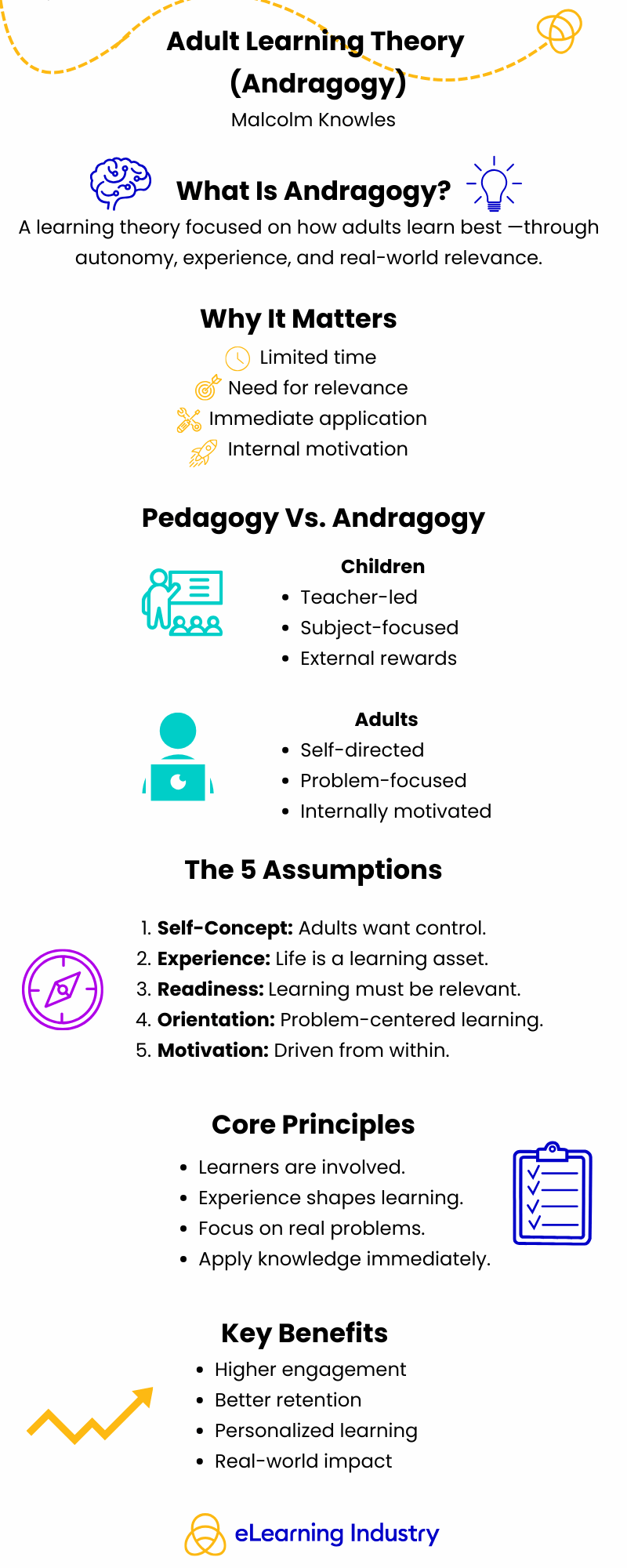The Adult Learning Theory: Andragogy
Adult Learning Theory, also known as andragogy, focuses on how adults learn differently from children. Today, this theory is widely applied in workplace training, online courses, and the ongoing education of professionals and students, as it addresses adult learners' unique needs and motivations.
Professionals and students often balance work, personal life, and technology, making it essential to have a flexible and mindful learning model. Adult Learning Theory is designed to provide this flexibility, enhancing retention and engagement. Therefore, it isn't surprising that, according to the American Society for Training and Development, the retention rate for experiential knowledge is at 75% when adults are given hands-on and customized learning experiences.
Adult learning theory offers practical insight for anyone developing training or educational content.
What you'll find in this article...
- What Is Adult Learning Theory?
- History Of Adult Learning Theory
- The Importance Of Adult Learning Theories
- The Difference Between Adult And Child Learning
- Knowles' 5 Assumptions Of Adult Learners
- Knowles' Principles Of Andragogy And More
- More Theories About Adult Learning
- Lesser-Known Facts About Adult Learning Theory
- Benefits Of Adult Learning Theory
- Challenges Adult Learners Face
- Application Of Andragogy In Personal Computer Training
- Apply Adult Learning Theory To Your Corporate Learning
- What Outcomes Should Andragogy Produce?
- Integrating Technology Into Adult Learning
- Conclusion
What Is Adult Learning Theory?
The term "andragogy" is often considered to be equivalent to "pedagogy." In Greek, andragogy translates to "man-leading," while pedagogy translates to "child-leading." It's important to note that the term pedagogy has been in use since Ancient Greek times, whereas andragogy was first introduced in 1833.
Adult learning theory is a learner-centered framework that underscores how adults learn differently from children. It is about understanding the motivations and context, such as life experiences, practical relevance, and internal drives, that influence adult learning. Unlike traditional pedagogical models, andragogy is about giving control to the learners. They choose when, what, and how they learn while bringing their real-life knowledge and responsibilities into the process.
Through adult learning, individuals, whether they are working professionals or students, gain a clear understanding of why they are learning something. This sense of ownership allows them to recognize the immediate value of their education. As a result, they are more engaged and retain the knowledge for longer.
History Of Adult Learning Theory
Andragogy is a term that was coined in 1833 by the German educator Alexander Kapp. Kapp used this term to support lifelong learning in adults, emphasizing that adult education focuses on vocational training, personal growth, and character development through experience and self-reflection. For several decades, the concept of andragogy faded into obscurity, even as global interest in adult learning continued to grow. However, in the 1920s, the German scholar Eugen Rosenstock-Huessy and the American educator Eduard Lindeman revisited the concept.
They revived the term to highlight teaching methods that are particularly appropriate for adults. Lindeman specifically pointed out that practical application and discussion-based learning significantly differentiate adult education from child-centered education. The modern framework of andragogy emerged in the late 1960s, thanks to the work of Malcolm Shepherd Knowles, an American educator who popularized the term "andragogy" as synonymous with adult education.
Knowles' groundbreaking article, "Andragogy, Not Pedagogy" (1968), along with his subsequent books, clearly defined the assumptions and principles that transformed adult education. According to Malcolm Knowles, andragogy is the art and science of adult learning; thus, andragogy encompasses any form of learning aimed at adults [1].
The Importance Of Adult Learning Theories
Understanding the complexities of how adults acquire and retain information is useful for creating meaningful training and educational programs. Unlike children and teenagers, adults have different motivations, expectations, and constraints, which is why theories like andragogy are valuable. These theories provide educators, course creators, and trainers with a clearer framework to engage with their learners.
Here are a few examples that illustrate how adult learning theory is applied in real life and emphasize its significance.
- Adults need learning that fits their busy lives.
A parent working a night job needs flexible, practical content, not dense lectures or rigid schedules. - They prefer learning that addresses real-world problems.
A sales representative benefits more from role-playing scenarios than from memorizing generic product descriptions. - They bring past experience into every lesson.
Experienced nurses don't need basic training; they need updated tools to build on their knowledge. - They want to learn at their own pace.
People with full-time jobs and two children likely prefer bite-sized, self-paced modules over live webinars. - Their motivation is mostly internal.
A mid-career professional is motivated not by superficial rewards, but by opportunities for meaningful career development.
- They need learning that meets them where they are.
A 60-year-old returning to school might struggle with apps a 25-year-old uses daily, so courses must adapt accordingly. - Instructors need a plan that works for adults.
Adult learning theory helps teachers in creating engaging content that values time and experience.
The Difference Between Adult And Child Learning
There are distinct differences between adult and child learning, particularly when it comes to designing educational and training courses or programs. Knowing these differences is the first step towards creating ongoing learning opportunities that are better for working professionals and other adult students. Below is a table that summarizes the distinctions.
Aspect |
Child Learning (Pedagogy) |
Adult Learning (Andragogy) |
Learner's Role |
The learning journey entirely relies on the educator for guidance, independence, and structure. | The learning is self-directed and self-controlled. Learners take ownership of their learning journey. |
Motivation |
Driven by external rewards like grades, marks, approvals, etc. | Driven by internal rewards like personal/professional growth, aims, skill advancement, etc. |
Experience |
Little to no experience, as the curriculum builds from the basics. | Experience is a resource, as it connects new knowledge with previous knowledge. |
Learning Focus |
Subject-centered and follows a pre-determined syllabus. | Problem- and goal-centered. Applicable to real-life scenarios. |
Readiness To Learn |
Scheduled and based on age/grade level. | Based on practical needs and life changes. |
Educator's Role |
An expert educator teaches in an authoritative environment. | A coach, trainer, or facilitator teaches in a flexible environment for self-directed learning. |
Knowles' 5 Assumptions Of Adult Learners
In 1980, Malcolm Knowles proposed four key assumptions about the characteristics of adult learners, known as andragogy, which differ from the assumptions made about child learners, or pedagogy. In 1984, he added a fifth assumption. Knowles explored why adults require a different approach to learning and identified five important factors that distinguish adult learners from children. These insights can enhance your own learning experience or improve your ability to teach and train others effectively.
1. Self-Concept: Adults Like To Be In Charge
As people mature, their self-concept evolves from being dependent to becoming more self-directed. Adults don't want to be told what to do, and they want the freedom to choose how, when, and what they learn. Therefore, flexibility is essential in both learning and teaching. Adult learners should be empowered to guide their own learning journey.
2. Adult Learner Experience: It Is A Resource
People accumulate a wealth of experiences that serve as valuable resources for learning as they grow up. They bring years of personal and professional knowledge into their learning environments, which enhances the educational experience. Effective education and training recognize this and adapt accordingly. It's natural for adults to question new information based on their existing knowledge, and that's perfectly acceptable.
3. Readiness To Learn: Relevance Is Everything
Readiness to learn becomes more focused on the developmental tasks associated with an adult's social roles. Most adults are not learning just to pass a test. They want to gain knowledge that will help them now and in the future, enhancing their personal or professional lives. When the course or program material is applicable, they are more likely to pay attention.
4. Orientation To Learning: Solutions Must Solve Real-Life Problems
Adults' perspective on time changes from delaying the application of knowledge to seeking immediate application. As a result, their focus on learning shifts from being centered on subjects to being centered on solving problems. Understanding theories is fine, but they want solutions. Adults learn better when courses and programs help address and tackle everyday issues. Therefore, incorporating checklists, real-life scenarios, tools, templates, and gamification elements can greatly enhance their learning experience.
5. Motivation To Learn: It Is Internal
Unlike children, who often need external factors to motivate them to learn, adults typically possess internal motivation [2]. Adults are not interested in superficial rewards; they seek learning for self-improvement, confidence building, career advancement, or to pursue meaningful interests. To enhance retention, education and training for adults must focus on empowering them.
Knowles' Principles Of Andragogy And More
In 1984, Knowles suggested four principles for adult learning. He built upon his foundation of assumptions to emphasize active participation, relevance, and practical application. Let's discuss the four principles presented before exploring additional principles introduced by later research and educational practices.
1. Learner Involvement In Planning, Evaluation, And Other Aspects
Adults grasp information better when they have a say in their learning process. They need goal setting, content selection options, and outcome assessment to feel a sense of ownership and motivation. For instance, during a skill development workshop, participants may collaborate to identify topics based on their professional roles, ensuring that the training is directly applicable to their needs.
2. Experience As A Resource
Adults cannot disregard the valuable experiences and insights they have gained over the years. These experiences should be incorporated into the learning process to enhance discussions and training sessions.
3. Immediate Relevance To Real Life
Adults are motivated to learn when they want to grow and improve their real-life situations. Training programs and education courses that are focused on real-life scenarios and tasks help adults learn better. Providing tools and resources relevant to current projects, skill development, or other needs is more effective and efficient.
4. Problem-Centered Learning
Unlike traditional education, which focuses on memorization, adults excel when their learning revolves around addressing immediate problems or challenges. Problem-centered learning fosters practical application and promotes critical thinking.
More Theories About Adult Learning
While Malcolm Knowles' andragogy offers fundamental insights into adult learning, there are a few other theories that provide additional perspectives. Here are a few of them and their principles.
Transformative Learning Theory (Mezirow)
Jack Mezirow's Transformative Learning Theory focuses on how adults adjust their perspectives through critical reflection and discussion. This theory is particularly relevant when adult learning involves challenging deeply held beliefs and assumptions. The key principles of transformative learning include the following:
- A life event or crisis can challenge an existing perspective and lead to a disorienting dilemma that prompts reflection.
- Critical reflection occurs when adults analyze and question their beliefs, values, and assumptions.
- Rational discourse takes place when adults engage in dialogue to validate new perspectives.
- Adopting new ways of understanding and interpreting experiences results in perspective transformation.
Experiential Learning Theory (Kolb)
David Kolb's Experiential Learning Theory highlights that learning is a process where knowledge is created by transforming experiences. It features a cyclic model consisting of four stages and several principles that guide acquiring and applying new knowledge.
- Gaining concrete experience by engaging in new situations.
- Focusing on reflective observation to understand and spot any inconsistencies between experience and comprehension.
- Forming new ideas or modifying existing concepts based on reflections.
- Applying the new ideas to real-life situations to see the results.
Lesser-Known Facts About Adult Learning Theory
While Knowles' work is widely cited, many overlook several insights about adult learning.
- Andragogy is older than you think. The term was coined in 1833 by German educator Alexander Kapp. Knowles revived and modernized it over a century later.
- Most adult learning is informal. Up to 90% happens outside classrooms, through work, social interactions, and self-study.
- Adults keep learning as they age. Thanks to neuroplasticity, the brain continues forming new connections well into later life.
- Culture influences how adults learn. Some cultures may prefer group learning, while others prefer individual learning paths.
- Emotions matter. Motivation, confidence, and even anxiety can directly impact how well adults absorb and retain information.
- Technology is reshaping learning. Online courses and mobile tools offer flexibility that adults value deeply.
- Continued learning improves mental agility and reduces cognitive decline. Lifelong learning boosts brain health.
Benefits Of Adult Learning Theory
Understanding how adults learn makes education more effective and meaningful. Here are the key benefits of applying adult learning theory.
- Learner Engagement
Adults are more attentive when the material relates to their lives or jobs. - Memory Retention
When adults connect new ideas to real-life experiences, they tend to remember the knowledge better. - Self-direction
Adults who have control over their learning feel more confident and motivated. - Improved work results.
Training that adheres to adult learning principles often results in better job performance. - Accommodating various learning styles.
Everyone learns differently, and this approach allows for that flexibility. - Lifelong learning.
When individuals feel respected and successful as learners, they are more likely to continue their education. - Aligns learning with personal goals.
Adult learning theory helps trainers and educators focus on what is most important to the learner.
Challenges Adult Learners Face
Adult learners often face unique challenges that impact their ability to engage and succeed. Many adults face real barriers that can affect how, when, or whether they learn at all.
- Limited time.
Balancing jobs, family, and personal commitments makes it challenging to focus on learning. - Fear.
Some adults worry about failing, feeling out of place, or not being tech-savvy enough. - Old habits can be hard to break.
Adults may resist new ideas if they conflict with long-held beliefs or past experiences. - Technology can present a hurdle.
Not everyone is comfortable using online platforms, apps, or digital classrooms. - Losing motivation.
Without clear goals or visible progress, adults may struggle to stay engaged. - Support is not always available.
Some learners lack mentors, peer groups, or resources to help them succeed. - Losing confidence.
After years away from school, many adults doubt their ability to learn again.
Understanding these challenges allows educators and trainers to create more flexible, supportive, and effective learning experiences.
Application Of Andragogy In Personal Computer Training
Knowles [3] provides an example of applying andragogy principles to the design of personal computer training:
- There is a need to explain the reasons behind teaching specific topics, such as certain commands, functions, and operations.
- Instruction should focus on completing tasks rather than promoting memorization; learning activities should be contextualized around common tasks that others need to perform.
- Instruction must consider learners' diverse backgrounds; learning materials and activities should cater to various levels and types of prior experience with computers.
- Since adults are typically self-directed, instruction should promote self-discovery of knowledge without relying solely on others for guidance. However, support should be provided to help learners when they make mistakes.
Apply Adult Learning Theory To Your Corporate Learning
Using Malcolm Knowles' Adult Learning Theory (andragogy) in corporate learning entails designing training curricula according to adults' valid learning preferences. Here's how to use these fundamental ideas in teaching adults:
- Make use of past experience: Adults have experience and knowledge. They should incorporate these experiences into training through peer-to-peer sharing, case studies, and conversations.
- Make problem-centered training a priority: Adults prefer a learning process that targets current work issues. Training based on actual situations is more interesting and practical for their learning.
- Verify relevance: Employee responsibilities and career objectives must directly link to learning. People are more inclined to participate when they can observe how training enhances their performance.
- Promote independence: When adults can take charge of their education, they flourish. Providing self-directed, flexible pathways and self-paced modules makes people feel valued and empowered.
- Make use of practical, hands-on learning: Active engagement and practice are the best ways for adults to learn. On-the-job application, role-plays, and simulations all aid in their efficient knowledge retention.
What Outcomes Should Andragogy Produce?
Now that you understand how to apply adult learning theory to your corporate learning, let’s uncover what outcomes andragogy produces in this section.
1. A Mature Understanding Of Oneself
Self-awareness is one of the main results of andragogy learning strategies. Adults are more equipped to function well in the job when they are aware of their motivations, strengths, and limitations. Therefore, corporate learning styles should promote introspection, goal-setting, and self-evaluation so that staff members can see their strengths and areas for improvement.
2. Acceptance, Respect, and Love Toward Others
According to andragogy, effective learning should create empathy, inclusion, and respect for one another. This approach translates into creating cultures in business settings where cooperation flourishes and different viewpoints are respected. Training initiatives that build emotional intelligence, cultural sensitivity, and collaboration assist staff in forging closer bonds.
3. A Fluid And Dynamic Attitude Toward Life
In the evolving business world, individuals need to embrace adaptability and flexibility. Andragogy creates a dynamic perspective, which teaches learners to welcome change as a chance for personal development rather than fear it. Employees are better equipped to handle obstacles when they participate in corporate learning that promotes experimentation, creativity, and resilience.
4. Understanding And Reacting To Causes, Not Symptoms
Andragogy pushes learners to think critically and tackle issues at their core. So, employees taught using adult learning concepts can examine more fundamental concepts, such as customer unhappiness or antiquated procedures, rather than using short-term incentives to boost dropping sales. This approach guarantees that problems are handled successfully and sustainably by creating longer-term organizational improvement.
5. Understanding Human Experience
Another crucial result of andragogy is a greater understanding of the diversity of human experience. Adults learn from others' collective triumphs, disappointments, and lessons in addition to theory. Employees who comprehend human experiences acquire empathy and perspective and avoid prior blunders. As a result, teams become stronger and more resilient, able to overcome obstacles and accomplish organizational goals.
6. Understanding Of And Ability To Change Society
Ultimately, andragogy encourages students to consider their wider influence rather than just their specific duties. It translates into encouraging social responsibility, moral decision-making, and change-driven leadership in business settings. With this, workers know their labor impacts their communities, industries, and companies. Diversity, equality, and inclusion (DEI) training, corporate social responsibility (CSR), and sustainability reinforce the company's approach.
Integrating Technology Into Adult Learning
Technology has changed how adults learn. It allows people to study at their own pace, on their own time, from almost anywhere. Online courses, mobile apps, and interactive tools make learning more accessible. These tools support self-directed learning and give adults more control over how they learn.
Tech also allows for instant feedback. Quizzes, simulations, and real-time results help learners know what they've mastered and what they still need to work on. However, not all adults are comfortable with new technology.
That's why it's important to keep digital tools simple, useful, and optional where possible. Instructors should be ready to offer support or alternatives for those who need more guidance.
Conclusion
Like children, adults' learning process is multifaceted. In contrast to child learning, adult learning focuses on practical applications, real-life experiences, internal motivations, and much more. Over the years, this theory of learning has evolved with the changing needs of time, and it continues to shape how working professionals and students gain and retain knowledge. A better understanding of adult learning behaviors and patterns has helped individuals improve personally and professionally. What's more, it has helped educators, coaches, trainers, and mentors build effective courses and programs.

Find more education infographics on e-Learning Infographics
We highly encourage you to read the 9 Tips To Apply Adult Learning Theory to eLearning. In this article, we discuss how Knowles' 5 adult learning theory assumptions can be translated to modern-day eLearning experiences so that you can integrate the four principles of andragogy into your eLearning course for maximum learner engagement and motivation.
You may also find useful:
8 Important Characteristics Of Adult Learners
17 Tips To Motivate Adult Learners
The Adult Learning Theory – Andragogy – Infographic
References
[1] Kearsley, G. (2010). Andragogy (M. Knowles). The theory into practice database.
[2] Knowles, M. (1984). The Adult Learner: A Neglected Species (3rd Ed.). Houston, TX: Gulf Publishing.
[3] Knowles, M. (1984). Andragogy in Action. San Francisco: Jossey-Bass.
Further Reading
- Theory Name: Andragogy
- Adult Learning Theory and Principles
- Andragogy (Patrick Mendelsohn)
- Knowles, M. S. (1950) Informal Adult Education, New York: Association Press. Guide for educators based on the writer's experience as a programme organizer in the YMCA.
- Knowles, M. S. (1962) A History of the Adult Education Movement in the USA, New York: Krieger. A revised edition was published in 1977.
- Kearsley, G. (2010). Andragogy (M.Knowles). The theory into practice database. Retrieved from http://tip.psychology.org
Editor's Note:
We all know that learning as an adult can be a completely different experience from traditional schooling. Malcolm Knowles' Adult Learning Theory highlights that adults learn best when they connect new information to their life experiences, engage in problem-solving, and have control over their learning journey. Unlike young learners, adults thrive in self-directed learning environments where education is practical, relevant, and immediately applicable to personal and professional goals. We believe that this approach acknowledges that learning is most effective when it aligns with an individual's motivations, interests, and real-world challenges.
We at eLearning Industry have seen how digital education embraces these principles. They offer flexible, personalized, and skills-based learning experiences. The rise of online courses, mentorship programs, and interactive learning platforms has empowered adults to learn in ways that fit their unique needs. Whether you are a professional looking to upskill, an entrepreneur mastering new strategies, or a lifelong learner pursuing a passion, digital education offers opportunities that traditional systems often lack. The future of learning isn't about rigid structures but effectiveness, accessibility, and engagement. Education designed with adult learners in mind becomes a powerful tool for transformation, growth, and success.








